
Hoi An Specialties by Season: What to Eat Throughout the Year
Hoi An’s cuisine has long been considered the soul of the ancient town, a beautiful blend of Vietnamese, Chinese, and Japanese influences that together create something uniquely local. Each season brings its own culinary rhythm: from light and refreshing spring dishes to rich autumn flavors and heartwarming winter treats.
If you’ve ever wondered “What should I eat in Hoi An this time of year?”, this guide will take you on a journey through the city’s best seasonal specialties. Whether it’s your first or fifth visit, every meal in Hoi An promises to be a new taste experience filled with local characters and stories.
1. Spring (Feb – Apr)
Spring in Hoi An is mild, breezy, and full of life. It’s also when local farms and the famous Tra Que herb village burst with fresh greens the perfect time to enjoy light, refreshing dishes that balance flavor and simplicity.
1.1. White Rose Dumplings (Banh Bao Banh Vac) – Light and Delicate for Mild Weather
Often called the “White Rose of Hoi An,” these delicate dumplings are the town’s culinary signature. Each piece is hand-shaped from translucent rice dough, filled with minced shrimp and pork, and gently steamed to perfection.
The dumplings are topped with crispy shallots and served with a light sweet-and-sour fish sauce. Their subtle aroma of new rice and warm texture make them a perfect start to a spring day by the Thu Bon River.
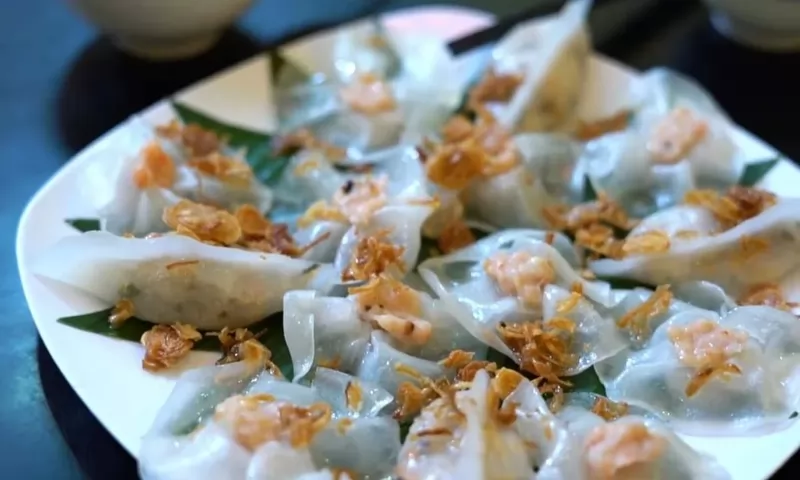
Where to try:
- White Rose Restaurant – 533 Hai Ba Trung Street, Cam Pho Ward, Hoi An
- Trung Bac Restaurant – 87 Tran Phu Street, Minh An Ward, Hoi An
- Trong Com Restaurant – 92 Bach Dang Street, Hoi An
- Price range: 50,000 – 100,000 VND per dish
1.2. Cao Lau – Iconic Hoi An Noodle Dish
More than just a dish, cao lau is the essence of Hoi An cuisine. The chewy golden noodles are made from rice soaked in the unique alkaline water from Cham Island, giving them their distinct texture.
A bowl of cao lau features slices of barbecue pork, crunchy pork cracklings, fresh Tra Que herbs, and a drizzle of rich broth. It’s hearty yet refined, a dish that perfectly captures Hoi An’s balance of simplicity and sophistication.
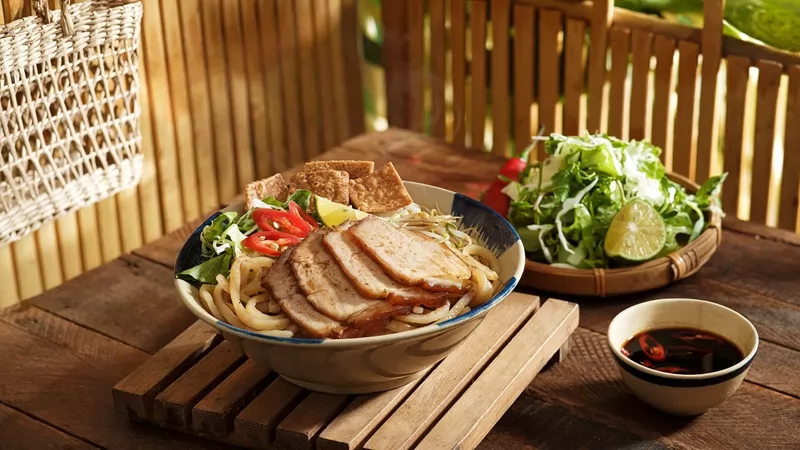
Where to try:
- Ba Be Cao Lau – 19 Tran Phu Street, Cam Chau Ward, Hoi An
- Thanh Cao Lau – 26 Thai Phien Street, Minh An Ward, Hoi An
- Trung Bac Cao Lau – 87 Tran Phu Street, Hoi An
- Price range: 30,000 – 50,000 VND per bowl
1.3. Fresh Spring Rolls With Local Herbs
When the weather is cool and gentle, nothing beats a plate of fresh spring rolls packed with shrimp, pork, vermicelli, and Tra Que herbs. The rolls are wrapped in soft rice paper and served with peanut dipping sauce — fresh, fragrant, and full of vitality.
This dish embodies the connection between Hoi An’s nature and its people: simple, colorful, and alive.
Recommended experience:
- Join a Cooking Class at Hoi An Memories Land or Tra Que Herb Village, where you can harvest herbs and learn to roll your own spring rolls.
- Price: 25,000 – 40,000 VND/portion
1.4. Seasonal Herbs and Vegetables From Tra Que Village
Just 3 km from the Ancient Town, Tra Que is known as the “green heart” of Hoi An. During spring, the village’s herbs - basil, perilla, fish mint, and coriander - are at their freshest and most fragrant.
Visitors can join a local farming tour: till the soil, water the vegetables, and enjoy a homemade lunch prepared from organic ingredients right in the garden.
- Location: Tra Que Village, Cam Ha Commune, Hoi An City
- Tour price: 150,000 – 350,000 VND/person
2. Summer (May – Aug)
Summer in Hoi An is all about sunshine, beaches, and seafood. As temperatures rise, locals turn to cooling, energizing dishes that highlight the abundance of the sea and the sweetness of tropical produce.
2.1. Mi Quang – Turmeric Noodles With Pork, Shrimp, or Chicken
Although a Central Vietnam specialty, Mi Quang in Hoi An boasts a unique flavor that you won’t find anywhere else. The golden turmeric noodles are served with a rich but light broth, topped with shrimp, pork, quail eggs, roasted peanuts, and crispy rice crackers.
The balance of textures, soft noodles, crunchy toppings, and savory broth makes this dish irresistibly satisfying.
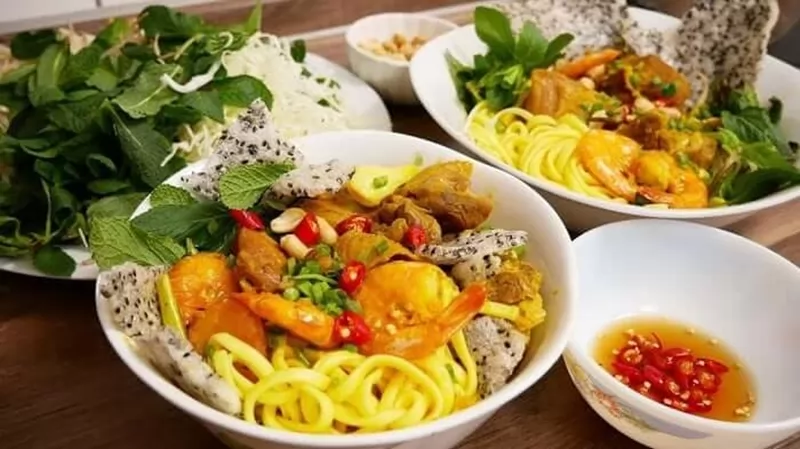
Where to try:
- Mi Quang Di Hat – 4 Phan Chau Trinh Street, Hoi An City
- Mi Quang Ong Hai – 6A Truong Minh Luong Street, Hoi An City
- Mi Quang Ba Minh – Cam Ha Commune, Hoi An City
- Price range: 20,000 – 50,000 VND per bowl
2.2. Grilled Seafood at An Bang & Cua Dai Beaches
Nothing says “Hoi An summer” like grilled seafood by the ocean. As the sun sets over An Bang or Cua Dai Beach, locals fire up charcoal grills for fresh shrimp, squid, scallops, stingray, and crab - seasoned simply with chili, lime, and green salt.
Enjoying seafood by the sea, with the scent of salt air and the sound of waves, is one of Hoi An’s most unforgettable pleasures.
Top spots:
- The DeckHouse An Bang Beach – An Bang Beach, Hoi An City
- Sea Village Restaurant – Cua Dai Beach, Hoi An City
- Bep 191 Restaurant – Lac Long Quan Street, Hoi An City
- Price range: 80,000 – 350,000 VND per dish
2.3. Fried Wontons (Hoanh Thanh Chien) with Salsa Topping
Crispy, colorful, and creative - Hoi An fried wontons are a delightful mix of Asian and Western flavors. The golden-fried wrappers are topped with a salsa of tomatoes, onions, and bell peppers, creating a tangy-sweet crunch in every bite.
This street snack is best enjoyed on a summer evening at the night market, where the air is filled with music, laughter, and the aroma of sizzling food.
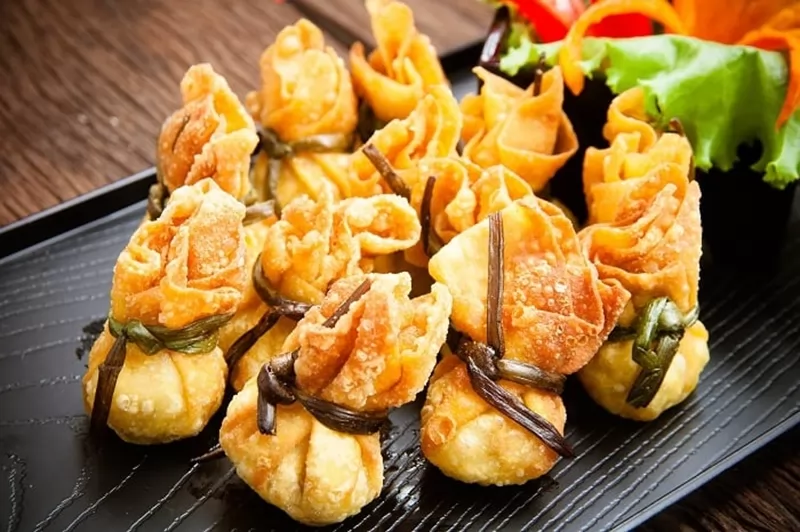
Where to try:
- Anh Ba Wonton & Noodle Shop – 109 Tran Hung Dao Street, Hoi An City
- Nguyen Loi Noodle Shop – 78 Tran Hung Dao Street, Hoi An City
- Price range: 30,000 – 70,000 VND per portion
2.4. Cooling Desserts: Che Bap (Corn Sweet Soup From Cam Nam), Herbal Teas
No summer in Hoi An is complete without a chilled bowl of che bap - sweet corn soup made with local Cam Nam corn, coconut milk, and rock sugar. It’s light, fragrant, and refreshingly sweet.
For an authentic local touch, try Mot Hoi An Herbal Tea, a signature drink made from lemongrass, lime, and herbs, known for its cooling and detoxifying effect.
Where to try:
- Che Co Le Stall – 369 Cua Dai Street, Hoi An City
- Che Hat Sen Pho Co – 1 Hoang Van Thu Street, Hoi An City
- Mot Hoi An Tea House – 150 Tran Phu Street, Hoi An City
- Price range: 10,000 – 30,000 VND per cup
3. Autumn (Sep – Oct)
Autumn is when Hoi An turns into its most romantic self - lanterns light up the old streets, the air turns cooler, and food becomes richer and more comforting. Every corner of the town seems to glow with golden light and the warm aroma of freshly baked bread and grilled dishes.
3.1. Banh Mi Phuong or Madam Khanh – Perfect Street Food in Cooler Evenings
Banh mi is Vietnam’s most famous street food, and Hoi An’s versions are considered among the best in the country. Banh Mi Phuong and Madam Khanh – The Banh Mi Queen are two local legends, each serving baguettes stuffed with grilled pork, pate, herbs, pickled vegetables, and a secret homemade sauce.
On a cool autumn evening, holding a warm, crispy baguette fresh from the oven is pure comfort - the taste of Hoi An in one perfect bite.
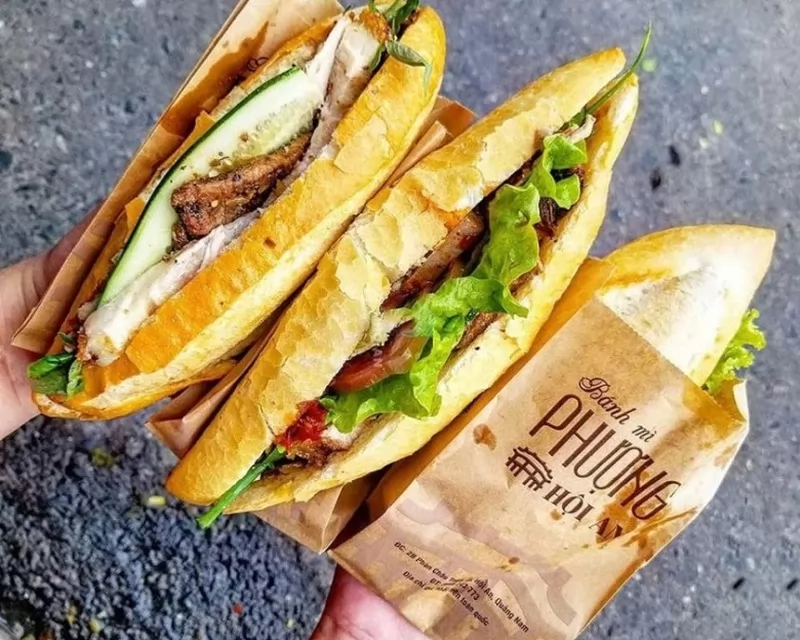
Where to try:
- Banh Mi Phuong – 2B Phan Chau Trinh Street, Hoi An City
- Madam Khanh – The Banh Mi Queen – 115 Tran Cao Van Street, Hoi An City
- Price range: 25,000 – 50,000 VND per loaf
3.2. Chicken Rice (Com Ga Hoi An) With Fresh Herbs
If cao lau represents the town’s spirit, then com ga Hoi An (Hoi An chicken rice) captures the heart of its home-cooked soul. The rice is cooked in rich chicken broth until golden and fragrant, served with shredded chicken, onions, Vietnamese coriander, and a side of chili garlic fish sauce.
It’s simple but deeply satisfying - the kind of meal that reminds locals of family gatherings and Sunday lunches.
Where to try:
- Ba Buoi Chicken Rice – 22 Phan Chau Trinh Street, Hoi An City
- Ba Ho Chicken Rice – 16 Phan Chu Trinh Street, Hoi An City
- Ba Nga Chicken Rice – 8 Phan Chau Trinh Street, Hoi An City
- Price range: 30,000 – 60,000 VND per plate
3.3. Mid-Autumn Specialties: Mooncakes, Lantern Festival Street Snacks
The 8th lunar month is one of the most magical times in Hoi An. The town glows under thousands of colorful lanterns, and the air is filled with the scent of mooncakes and roasted sesame candies.
Visitors can stroll through the old quarter or the night market, enjoy traditional snacks like sesame candy, glutinous rice cakes, or warm sweet soups, and soak in the festive atmosphere of music, laughter, and moonlit reflections on the river.
- Best areas: Nguyen Thai Hoc Street, Bach Dang Street, Hoi An Night Market (open 5:00 PM – 10:00 PM)
- Price range: 25,000 – 80,000 VND per treat
3.4. Seasonal Fruits: Rambutan, Longan, Persimmon
Autumn also brings an abundance of tropical fruits - rambutan, crisp persimmons, juicy longans, and fragrant lychees - all freshly harvested and sold at local markets.
They’re perfect as a refreshing dessert after a hearty meal or as gifts to take home from your Hoi An trip.
- Where to buy: Hoi An Market – 19 Tran Phu Street, Hoi An City
- Price range: 20,000 – 40,000 VND per portion or smoothie
4. Winter (Nov – Jan)
When winter arrives, Hoi An slows down. The Thu Bon River turns misty, and the town’s quiet charm returns. Rainy days call for warm, comforting dishes, the kind that fill the air with steam and the heart with warmth.
4.1. Hot Noodle Soups: Cao Lau, Mi Quang With Extra Broth
Unlike the dry versions served in warmer months, locals adapt cao lau and mi quang into soupier bowls during winter. The broth is rich, fragrant, and perfect for cold, rainy days.
A steaming bowl of noodles, topped with herbs and tender pork, is one of the simplest joys of a Hoi An winter.
Where to try:
- Mi Quang Di Hat – 4 Phan Chau Trinh Street, Hoi An City
- Thanh Cao Lau – 26 Thai Phien Street, Hoi An City
- Price range: 25,000 – 45,000 VND per bowl
4.2. Grilled Corn, Sweet Potato on Street Corners
During cold evenings, you’ll spot small charcoal stoves on sidewalks with vendors grilling corn and sweet potatoes. The smoky aroma fills the air, and the food, slightly charred outside, soft and sweet inside - is irresistibly nostalgic.
This simple snack captures the essence of winter in Hoi An: cozy, humble, and heartwarming.
- Best streets: Bach Dang Street & Tran Phu Street (6:00 PM – 10:00 PM)
- Price range: 10,000 – 20,000 VND per portion
4.3. Herbal Teas & Warm Soy Milk
After an evening walk or night market visit, a hot cup of Mot herbal tea or warm soy milk is the perfect way to relax. The tea, infused with ginger, lemongrass, and licorice, soothes the body, while soy milk offers gentle sweetness and comfort.
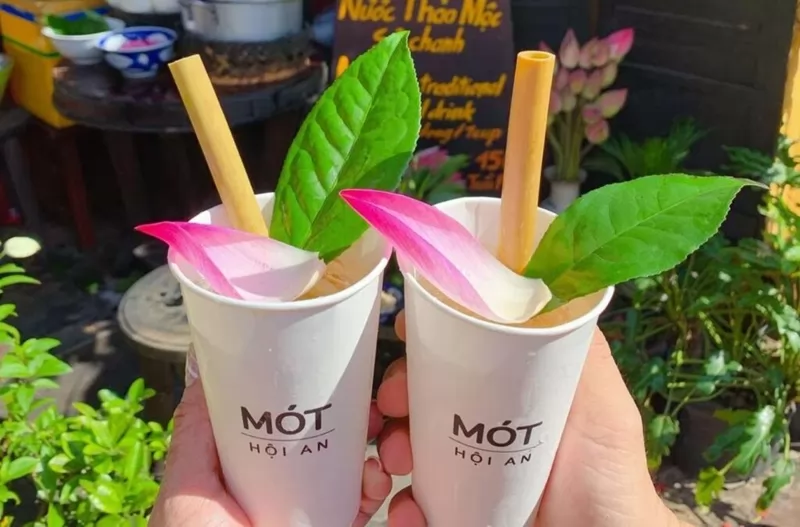
Where to try:
- Mot Hoi An Herbal Tea – 150 Tran Phu Street, Hoi An City
- Price range: 15,000 – 30,000 VND per cup
4.4. Festive Dishes During Tet: Banh Tet, Pickled Vegetables, Pork Rolls
As the Lunar New Year approaches, Hoi An comes alive with the scent of traditional holiday foods: banh tet (sticky rice cakes wrapped in banana leaves), pickled vegetables (dua mon), and pork rolls (cha lua).
Beyond their taste, these dishes represent family reunion, warmth, and prosperity, values that the people of Hoi An hold dear every Tet season.
- Where to find: Hoi An Market – Traditional Food Section, 19 Tran Phu Street, Hoi An City
- Price range: 60,000 – 120,000 VND per roll or package
5. Tips for Enjoying Hoi An Specialties by Season
Hoi An’s cuisine isn’t just about taste — it’s about the experience. To truly savor it, immerse yourself in how locals eat, shop, and celebrate each season.
5.1. Visit Local Markets (Hoi An Market, Night Market) for Seasonal Snacks
Both Hoi An Market and Nguyen Hoang Night Market are culinary treasure troves. Each season brings new street foods - banh vac in spring, che bap in summer, mooncakes in autumn, and grilled corn in winter.
Everything is freshly made and affordably priced, giving visitors a full-year food journey in just one evening walk.
5.2. Join a Cooking Class in Tra Que or Thanh Ha for Seasonal Ingredients
For an authentic local experience, join a cooking class where you’ll harvest ingredients, learn traditional recipes like cao lau and spring rolls, and understand how each season shapes local flavors.
The seasonal approach ensures that no two classes are ever the same - a true reflection of Hoi An’s dynamic food culture.
5.3. Street Food Tours Are Best in Dry Evenings (Feb–Aug)
During the dry season, street food tours are a must. As lanterns glow above and the streets fill with music, follow your guide through alleys and markets to sample fried wontons, banh mi, sweet soups, and more.
It’s not just a meal - it’s a way to live and breathe the rhythm of Hoi An’s nights.
6. Conclusion
Hoi An’s culinary charm lies in its seasonal harmony. Each time of year paints a different flavor story, from the freshness of spring herbs and summer seafood, to the warmth of autumn comfort food and winter delicacies.Every dish, simple or elaborate, carries a piece of the town’s history, climate, and soul.
To make your visit even more special, explore authentic culture and flavors at Hoi An Memories Land. Contact us via 1900 63 66 00 – 0904 636 600 or visit hoianmemoriesland.com to plan your unforgettable journey.
-
Hotline: 1900 63 66 00
-
Press 1 For tickets
-
Press 2 For Customer Service
Latest news

Mot Tea Hoi An: A Refreshing Herbal Drink in the Heart of the Ancient Town

A Comprehensive List of Spas in Hoi An: Relaxation and Wellness Experiences 2026

10 Must-Visit Wellness and Spa Resorts in Hoi An

The Long Chu Festival in Hoi An: A Spiritual Ritual and Cultural Experience in the Heart of the Ancient Town













Comment